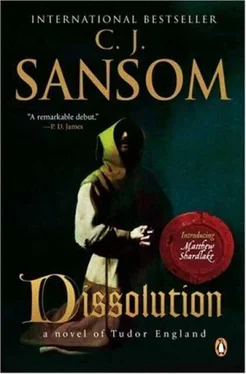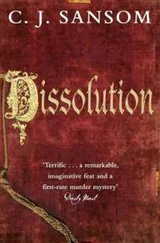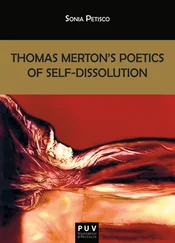C. Sansom - Dissolution
Здесь есть возможность читать онлайн «C. Sansom - Dissolution» весь текст электронной книги совершенно бесплатно (целиком полную версию без сокращений). В некоторых случаях можно слушать аудио, скачать через торрент в формате fb2 и присутствует краткое содержание. Жанр: Исторический детектив, на английском языке. Описание произведения, (предисловие) а так же отзывы посетителей доступны на портале библиотеки ЛибКат.
- Название:Dissolution
- Автор:
- Жанр:
- Год:неизвестен
- ISBN:нет данных
- Рейтинг книги:5 / 5. Голосов: 1
-
Избранное:Добавить в избранное
- Отзывы:
-
Ваша оценка:
- 100
- 1
- 2
- 3
- 4
- 5
Dissolution: краткое содержание, описание и аннотация
Предлагаем к чтению аннотацию, описание, краткое содержание или предисловие (зависит от того, что написал сам автор книги «Dissolution»). Если вы не нашли необходимую информацию о книге — напишите в комментариях, мы постараемся отыскать её.
Dissolution — читать онлайн бесплатно полную книгу (весь текст) целиком
Ниже представлен текст книги, разбитый по страницам. Система сохранения места последней прочитанной страницы, позволяет с удобством читать онлайн бесплатно книгу «Dissolution», без необходимости каждый раз заново искать на чём Вы остановились. Поставьте закладку, и сможете в любой момент перейти на страницу, на которой закончили чтение.
Интервал:
Закладка:
The bells began their clangour; the monks would be in service now for an hour. At least, I reflected, that would provide an opportunity to do what Singleton had done, and I myself should have done earlier: investigate the counting house while Brother Edwig was out of the way. Despite my exhaustion and the weight of anxiety upon me, I realized I felt better in myself, less sluggish of mind somehow. I took another dose of Brother Guy's potion.
I made my way quietly down the dim nave, invisible to those chanting behind the rood screen. I put my eye to one of the ornamented gaps in the stone, fashioned to give lay people in the congregation a tantalizing glimpse of the mystery of the Mass being performed on the other side.
Brother Gabriel was conducting, apparently absorbed in the music. I could not but admire the skill with which he led the monks in the chanting of the psalm, their voices rising and falling in harmony as their eyes moved between his directing hands and the service books on their lecterns. The abbot was present, his face sombre in the candlelight. I remembered his last despairing whisper: 'Dissolution.' Looking over the monks I saw Guy and, to my surprise, Jerome next to him, his white Carthusian habit standing out in contrast to the Benedictine black. They must be letting him out for services. As I watched, Brother Guy leaned over and turned a page for the crippled Carthusian. He smiled, and Brother Jerome nodded with thanks. It struck me that the infirmarian, with his austerity and devotion, might be one of the few at Scarnsea of whom Jerome might approve. Were they friends after all? They had not seemed so when I had come upon Guy dressing Jerome's wounds. My eye turned to Prior Mortimus, and I saw he was not chanting, but staring fixedly before him. I remembered he had been horrified, and angered too, at the sight of the girl's body. Brother Edwig, in contrast, was singing lustily, standing between Brother Athelstan and his other assistant, the old man.
'Which of them?' I whispered under my breath. 'Which of them? God, guide my poor brain.' I felt no answering inspiration. Sometimes in those desperate days it seemed God did not hear my prayers. 'Please let there be no more deaths,' I prayed, then silently rose and left the church.
The cloister yard was deserted as I inserted the key marked 'Treasury' into the lock of the counting house. The damp chill of the interior made me shiver and I gathered my coat around me. All was as before; the desks, the ledger-lined walls, the chest against the far wall. A candle had been left burning on a table and I took it over to the chest. Selecting another key, I opened it.
The interior was divided into racks filled with bags, each with the denominations of the coins they contained and the totals entered on tags. I took out those containing gold coins; angels, half-angels and nobles. Opening a couple at random, I counted out the coins, checking the marked total. Everything tallied, and the amount recorded in the chest agreed with what the accounts had shown. I closed it. As big a sum here as in any counting house in England, and secure enough, for a monastery was harder to get into and rob than a merchant's strongroom.
I took up the candle and opened the door to the staircase. I paused at the top. The counting house was a little higher than the other buildings and in daylight the window gave a view across the cloister to the fish pond and, beyond that, the marsh. I wondered whether the hand of the Penitent Thief lay down there in the pond; I would know on the morrow.
I unlocked the door to the bursar's private sanctum. Setting the candle on his desk, I began by glancing at some of the ledgers stacked round the walls of the windowless, claustrophobic room; they were routine accounts, going back years. The desk was tidy, papers and quills set out with geometric straightness. Brother Edwig seemed a man obsessed with order and precision.
The desk had two deep drawers. I tried key after key until I found one that would unlock them. The first contained a couple of Latin books, which I lifted out: Thomas Aquinas's Summa Contra Gentiles and Summa Theologiae. I looked at them with distaste; so Brother Edwig had a taste for the old discredited scholasticism of the Italian saint. As though one could prove God's existence by logic, when only faith would answer; but I could imagine Aquinas's desiccated syllogisms appealing to that arid mind.
I replaced the books and unlocked the other drawer. Within was a stack of ledgers laid on top of each other. I smiled grimly; all had blue covers. 'Thank you, Alice,' I breathed. Three or four were like the one he had given me, filled with rough notes and calculations going back several years. One had a wine stain on the cover, but to my disappointment it contained only more jottings. I pulled out the last one, which was also stained. He must have been drinking wine one day, and spilled the flagon. That would have annoyed him, having his pristine books so marked.
The last book contained records of land sales going back over the last five years. My heart began to pound and my body felt suddenly charged with excitement. I laid it on the desk and brought the candle close with a hand that trembled slightly, coughing as the wick smoked. Details of the parcels sold, the buyers, the prices and the dates the documents were sealed. I looked at the most recent. According to the book there had been four large sales in the last year which had not been recorded in the monastery's account books. They totalled nearly a thousand pounds, an enormous sum. One of them, the largest, was to Jerome's relative. I blew out my cheeks. This must be the book Singleton had seen.
I thought a moment, then took a paper and quill from the desk and rapidly copied the entries down. Copynger could be set to confirm these sales had actually taken place. I would have no more of tales of notes and projections; this time I would present Brother Edwig with evidence he could not wriggle away from.
I replaced the books and paced the room slowly, reflecting. Had the bursar and the abbot too, as he had custody of the monastery seal, been engaged in fraud? Surely they must know that if the monastery was surrendered and the Augmentations officials came in, they would be found out. Or could Edwig have gained access to the seal and used it without the abbot's knowledge? It would be easy enough. And where was the money? The proceeds of these sales constituted another half-chestful of gold. I stood looking at the backs of the old ledgers that lined the walls, wondering.
Something caught my eye. The candle flame was flickering. I realized there was a draught behind me; the door had been opened. I turned slowly. Brother Edwig stood in the doorway, staring at me. He cast a quick glance at his desk, which I was glad I had relocked. Then he pressed his palms together and spoke.
'I had n-no idea anyone was here, Commissioner. You startled me.'
'I am surprised you did not call out.'
'I w-was too astonished.'
'I am allowed all access. I decided to have a look at some of these ledgers you have round the walls. I had just begun.' Had he seen me at his desk? No, or I would have felt the draught before.
'I fear those are only old accounts.'
'So I see.'
'I am g-glad to see you, sir,' he said, giving his quick mirthless smile. 'I wanted to ap-pologize for my outburst this morning. I was upset by the ceremony's interruption. I beg you will take no note of w-words spoken in thoughtless heat.'
I replaced the ledger, inclining my head. 'I know many think as you do, even if they do not say it. But you are wrong. Such moneys as go to the Exchequer will be used by the king to benefit the commonwealth.'
'Will they, sir?'
'You think not?'
'In these days when all men are consumed by greed? Is it not said covetousness was never more attacked nor more seductive? His friends will pressure the king for largesse. And who can hold the k-king to account?'
Читать дальшеИнтервал:
Закладка:
Похожие книги на «Dissolution»
Представляем Вашему вниманию похожие книги на «Dissolution» списком для выбора. Мы отобрали схожую по названию и смыслу литературу в надежде предоставить читателям больше вариантов отыскать новые, интересные, ещё непрочитанные произведения.
Обсуждение, отзывы о книге «Dissolution» и просто собственные мнения читателей. Оставьте ваши комментарии, напишите, что Вы думаете о произведении, его смысле или главных героях. Укажите что конкретно понравилось, а что нет, и почему Вы так считаете.











